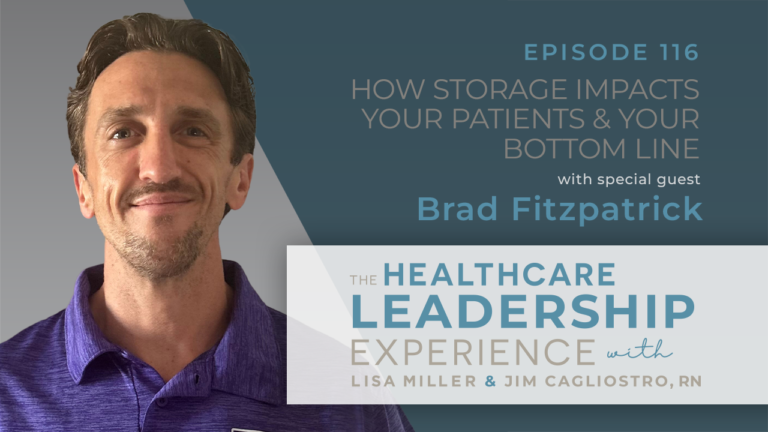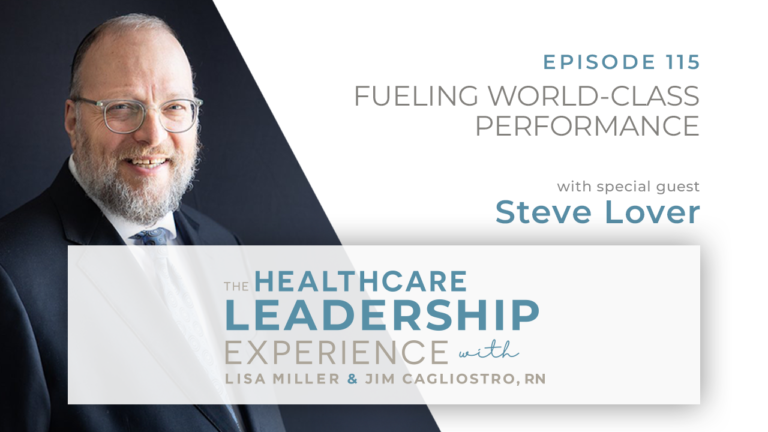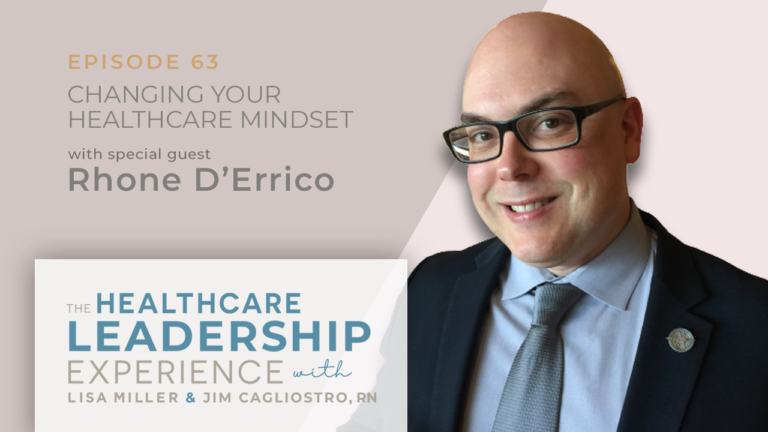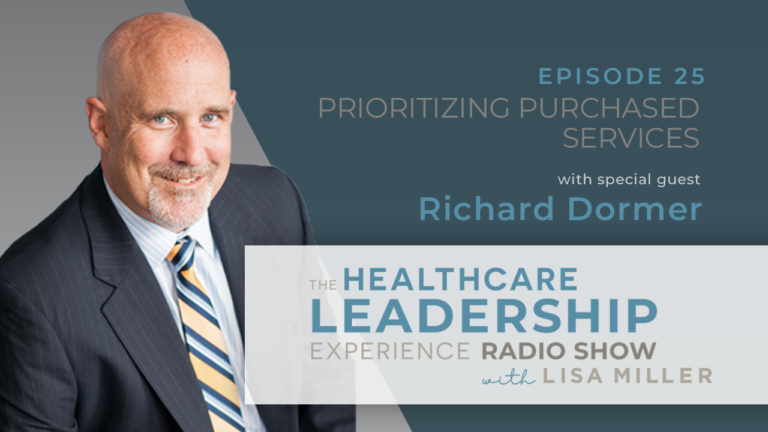Intrapreneurship will be the key to successful employee engagement in healthcare in 2022 and beyond.
In Episode 29 of The Healthcare Leadership Experience, Lisa is joined by Lisa Larter from The Lisa Larter Group to discuss predictions for healthcare in 2022.
As Lisa observes: ‘’ ..the protection is going to be around measuring and monitoring, capturing opportunities in real-time. No longer looking back and saying, “Oh, wow, we missed that opportunity 12 months ago…and we’ve had this year of overspending.. we need to do things in real-time.. that has to be a must.’’
This episode is sponsored by VIE Healthcare Consulting® which has proudly helped hospitals save $772 million since 1999.
In today’s episode you’ll hear:
- The need for back-ups, substitutes, and data analysis in hospital supply chain.
- Why innovation and collaboration will be critical to success in 2022, without moving to over-reliance on GPOs. ‘’.. I love to see hospitals more self-reliant, more collaborative, maybe with a startup that wants to pivot and move into healthcare.’’
- The importance of high-performance healthcare contract management in the face of rising inflation, and why hospitals have to push back on vendors. ‘’.. We all need to be contributors to the success of patient care.’’
- Why all hospitals need protection around measuring and monitoring to capture opportunities for cost savings in real-time.
- The challenges of the ‘’great resignation’’, and why intrapreneurship will be the key to successful employee engagement in healthcare in 2022 and beyond.
- How the most effective innovators focus on small, frontline driven innovations. ‘’It’s not a suggestion box, it’s a process.’’ Hint: Every hospital leader should watch Undercover Boss.
- The need for hospitals to think differently in engaging strategic advisors, and the role of fractional positions. ‘’We often think about fractional positions as a fractional CFO or CMO, but you could have fractional project managers, fractional data analysts …it’s thinking differently.’’
Learn more about the healthcare trends every hospital needs to know in Episode 28 of The Healthcare Leadership Experience.
We’d love your feedback and topic suggestions for future episodes of The Healthcare Leadership Experience, connect with Lisa.
Connect with Lisa:
📧 lmiller@spendmend.com
📱https://www.linkedin.com/in/lisamiller/
Episode Transcripts
CLICK HERE TO DOWNLOAD THE PDF TRANSCRIPT
CLICK HERE TO OPEN THE FULL TRANSCRIPT
Speaker 1 (00:02):
Welcome to the Healthcare Leadership Experience Radio Show with your host, Lisa Miller. Lisa is an entrepreneur, inventor, advisor and founder of VIE Healthcare Consulting, the leading healthcare advisory and analytics firm helping hospitals accelerate their margin improvement goals. Lisa loves to think differently and collaborates with leaders and their teams to solve challenges and to create new innovative approaches that impact the clinical and business side of healthcare. Our show will bring you leaders and innovators within healthcare and across multiple industries. Be a part of the discussion that will give you a unique perspective, deep insights, and roadmaps to successfully help you navigate the clinical, financial, and operations of healthcare. Your show starts now.
Lisa Miller (00:50):
Hello, this is Lisa Miller, and this is the Healthcare Leadership Experience. I am so excited as this is our first show on Healthcare Radio NOW, where we are going to be on every day, Monday through Friday, 5:00 AM, 1:00 PM and 9:00 PM. So, I encourage all my listeners to check out Healthcare Radio NOW where there is a whole suite of phenomenal healthcare podcasters. And I am thrilled for this opportunity. So today, I’m here again with my podcast producer and marketing strategist, Lisa Larter. And just like we did on last show, Lisa’s going to interview me on predictions for 2022. And if you missed last week’s show, she asked me all about trends in healthcare. So go back to Episode 28 and listen in. And I’d like to wish everyone a very happy New Year. I hope you had a great time with your family and friends and had time to relax and do the things that you enjoy to do. And I appreciate that you’re listening to the Healthcare Leadership Experience. So we’re gonna jump right in and I’m gonna hand this over to Lisa Larter to ask me some questions.
Lisa Larter (02:08):
Well, it’s so good to be here and to be embarking on another year. Uh, I’m always, uh, so nostalgic at the beginning of the year, you know, thinking about all the things that I wanna plan and accomplish. I hope, Lisa, that you had a really happy holiday season with your family as well.
Lisa Miller (02:26):
I-I did. As you know, I have, uh, some big shifts in my personal life, but all things are good. Family’s doing well. And you know, I’m also very excited about the new year, it gives us an opportunity to reflect on the past and kind of reset and- and look at the future and get excited about new goals and things we can do in our personal lives and in our businesses. Right?
Lisa Larter (02:52):
Absolutely. And as we look to this new year, and you know, reflect on the year that has passed, I’d love to talk about what you perceive as being a new normal in healthcare and some of the predictions that you have for your industry. There’s a lot of things going on in the media and the news right now that are going to impact business and healthcare. And so, let’s start by talking about supply chain. How do you anticipate supply chain challenges will affect hospitals, if at all?
Lisa Miller (03:35):
So I think there’s a lot of aspects that the supply chain will have on healthcare. And probably we could have two or three podcasts on this, but I think there are a couple things that really jump out at me. And I think it’s really around hospital planning, preparedness, and being anticipatory. So, there are a couple things. You know, we have some hospitals that are looking to have backups, you know, not just in the exact item that they have, but how do they have alternatives, substitutes, so they have a second alternative, third alternative? And it’s really their ability to go into their data, mine their data, look at back orders, look at the things that are most challenging for them, pivot and say, “Okay, we need to have substitutes for these items.” You don’t need substitutes for everything. You need to focus on the substitutes that are giving you the most challenges or that they’re high priority. So I think it’s, again, looking at your data, and how do you protect your organization from those challenges, ’cause you can always look back historically to see those challenges. We should be looking at backwaters, we should be looking at those problematic items and how do we become anticipatory going forward?
Lisa Larter (04:54):
I love that. The idea of having a backup to the backup to the backup plan.
Lisa Miller (04:58):
(laughs). Yeah.
Lisa Larter (04:58):
Smart.
Lisa Miller (04:59):
Plan B, plan C, plan D (laughs). Definitely plan B. So that’s very important.
Now, the second order of consequence, because of having a plan B is this will cost hospitals more money. And so there needs to be some cushion and some planning around that increased cost in order to protect your supply chain. And so, number one, how do you budget for it? How do you put a dollar value to that? Because again, you can go to your data, and you can put a dollar to that, dollar value to that. And number two, how are we going to fund it? And, you know, of course, the best way to fund those types of planning and preparedness is through, you know, mining that through cost savings, or utilization savings, or looking at ways to, you know, shift, you know, from, you know, an excessive inventory and moving that down. Or, again, looking at your data in ways to cost shift in the sense that there’s probably some unnecessary spend, some unnecessary cost that you need to really double down on and then move to protecting your supply chain.
And I think there’s two other areas. Of course, innovation is important and collaboration. We know what are those things, you know, those items that you can buy that maybe you can manufacture regionally with another hospital, or maybe a startup? I know that some of this has been done with GPOs. And I- I get a little worried about that, because we then move to this, again, over reliance on a GPO. And where I love to see hospitals, more self-reliant, more collaborative, maybe with, again, a startup, or maybe a manufacturer that isn’t in healthcare that wants to pivot and move into healthcare. We saw a lot of that during the pandemic. And so wha- what does innovation play? And then looking at reusables. You know, there’s- there’s always been some controversy over reusing reusables, but I think hospitals have to look at that more and more as a viable option to protecting their supply chain. And of course, high-performing contracting will be required, right? Just really looking at contracting as a vehicle to provide that margin improvement.
Lisa Larter (07:27):
I love that. When you were talking about hospitals collaborating on manufacturing, it made me think that somebody should start an HPO, a healthcare purchasing organization so that, you know, hospitals really can maximize their buying power together. What about the impact of inflation, Lisa? I mean, we heard all kinds of stories around Thanksgiving and Christmas about the cost of the family dinner, what do you think the impact of inflation is going to be on hospitals? And what are some of the things that healthcare leaders should be doing or can be doing to mitigate this risk?
Lisa Miller (08:08):
Yes, so there’s a convergence of all these aspects in- of inflation. So of course, it’s supply chain, it’s higher costs, it’s the labor shortages. So we are going to be really significantly impacted by inflation. And, you know, there’s certain areas like food costs, material costs, labor costs, distribution costs, all these costs will start impacting hospitals. And so there’s a kind of a multi-strategy approach to this, right? So legitimately, vendors are going to have costs that they’re going to pass on. However, some of that may be a little opportunistic, and the hospitals have to balance the reality of what’s real, versus what may be an overarching reach to get higher cost and to push out the vendors’ margin. So hospitals have to really protect their own margins, they have to be able to push back a little bit. And maybe this is the time the vendors are going to need to give a little bit more and maybe not pass through everything. This could be the time that it’s not “let’s push through everything to the hospitals”, because I don’t know where hospitals are going to get this. They can’t charge more money.
And so, you know, the hospitals are gonna have to get a little, maybe a little more tougher, a little more pushing back, and- and the vendors may have to have a, you know, little bit thinner margins for the short term. And we are in different industry and I think the industry we’re in is healthcare and we all need to be, uh, contributors to the success of patient care. And so there are other areas that hospitals can look to kinda mitigate and protect, and the protection’s going to be around measuring and monitoring, capturing opportunities in real time. No longer looking back and saying, “Oh, wow, we missed that opportunity 12 months, 16 months ago. What had happened? And now we’ve had this, you know, year of overspending, overutilizing, we need to do things in real time.” And that has to be a must. You’ve gotta put this real-time view into expenses to capture opportunities, capture errors, variations as they happen.
So if you’re just tuning in now, you’re listening to the Healthcare Leadership Experience Radio Show on Healthcare Radio NOW. I’m your host, Lisa Miller. Today, I’m joined by Lisa Larter, my producer, and we’re talking about 2020 healthcare predictions, and specifically, what has worked for hospitals and what has been their challenges. This show is sponsored by VIE Healthcare Consulting, the leading healthcare advisory and analytics firm helping hospitals accelerate their margin improvement goals. VIE has collaborated with healthcare leaders and their teams to accelerate their strategic initiatives and improve their financial performance by over $1 billion since 1999. So Lisa, I’d like to continue this, uh, interview that you did last show, and we’re continuing now on predictions. So I’ll hand it back over to you.
Lisa Larter (11:16):
Yeah, thank you, Lisa. I really enjoyed hearing what you said about inflation and the things that hospitals really need to be thinking about and considering for the future. I think that’s so, so valuable, especially, you know, the convergence that you talked about and the whole measuring and monitoring. It’s, uh, definitely your- your bang on there. So let’s talk about the next thing that we’re hearing. I’d love to get your prediction on this. There’s so much talk of the great resignation. And so I’m wondering, what are some of the things you expect healthcare leaders will do or need to do to retain their best healthcare workers? Or is this even a thing?
Lisa Miller (12:02):
Yeah, I- I think it is a thing and then it’s not a thing. But, you know, I think this is an aftermath of COVID and people wanting a different way to work. You know, some good, not so good. We need to be in collaborative environments, person-to-person to be effective. And it’s not to say that you can’t work from home, or we can’t care about a person’s preference about working. But I do feel like we lose a lot of innovation and collaboration and creativity, working from home, working remotely. And there needs to be time together. I know that that is so valuable here at VIE.
But, you know, in terms of the great resignation, and- and people shifting and the focus on engagement is about listening to them. Listening to their ideas, you know, listening to what they want for their careers, giving them growth opportunities, giving them opportunities to learn, right? Making that a priority. You know, where- where would you like to learn? You know, what things and skills would you like to learn? And, you know, this way they can show- showcase their expertise, or show- showcase their successes, you know? You wanna build a team of thought leaders. And, you know, people want growth, they want to learn, but they, but they also wanna have pride in their career. And I think that’s really important for healthcare leaders to give their teams and their employees ways to shine, ways to grow.
And this is a big one. I love intrapreneurship, right? So we’ve all heard of entrepreneurship, but intrapreneurship is developing entrepreneurs from within the organization. And I- I have an upcoming, uh, chapter in a book on innovation that I’m writing about intrapreneurship. But it’s a win-win, really, for hospitals, because there’s lots of entrepreneurship that’s going around in your hospital, and how are you capturing it? And how are you spreading it through the organization? Or how can you share that even further outside of the organization? But, you know, we’re creative, just by our nature, and you know, how are you engaging that creativity with your employees and communicating and allowing their ideas and their views to be heard? I think that’s gonna be a big, important part of employee engagement. It’s not all about money. It’s about time off, and it’s about flexibility, but I think it’s about their contribution.
Lisa Larter (14:33):
I love that and I love intrapreneurship. I think that, you know, if we’ve learned anything through, you know, the last couple of years of COVID, healthcare frontline workers are courageous and innovative. And I’m sure that from an intrapreneurial perspective, they will be able to contribute lots of great big ideas for the future. So speaking of frontline-driven innovation, how do you predict this will change at all next year, if at all?
Lisa Miller (15:08):
Well, I’m gonna start with a little quote from a book I’m reading I love. It’s called Big Little Breakthroughs by Josh Linkner. And he says, basically, 77% of economic growth comes from small advances, right? So instead of shooting for a $10 billion IPO, or Nobel Prize, the most effective innovators focus instead on something much smaller. According to Harvard University Professor Stefan Thump, 77% of economic growth is attributed to small creative advances, not radical innovations. So these small innovations are huge to an organization and it requires frontline-driven innovation. So how do you as a hospital, develop those frontline, you know, innovations? And it’s not a suggestion box. It’s a process and it really has to be set up in an environment that allows communication, you know, whether or not, you know, we wa- want everyone to be heard, we don’t like what they’re saying, it’s still, we still need that, you know, those environments.
Now, I’m gonna tell you some of the greatest ideas are these small, uh, innovations, and they can really, uh, grow or they can be enhanced, you know, by team environments. And really, the- they’re the fuel, they’re the fuel of your future. And so, you know, I- I love the show, Undercover Boss. And I don’t know if you ever watched it, Lisa? It’s-
Lisa Larter (16:41):
Yes, I love it, too.
Lisa Miller (16:42):
(laughs) It’s like one of my favorite shows. And in some of these really big corporations, their CEOs are, you know, going undercover, and they’re doing all these jobs, which I think it’s a great model for healthcare leaders to do. Not doing it, say, “Hey, look, I’m gonna work down in food services,” saying everybody follows them. It’s no going undercover and really doing different jobs. And there’s- there’s so many insights that come from it. You know, they don’t realize that their retail technology at the front, you know, isn’t working, or they don’t realize that they used to have a good training program and now they don’t. I mean, they uncover so many insights and they learn about their frontline people in such an empathic, you know, way, and it really brings the company closer and it becomes… You become a different leader when you’re leading and hearing from the frontline.
So I love that show. I think everyone should watch a few more episodes. But when you lead hearing from the frontlines, you’re- you’re going to get insights that are so powerful.
Lisa Larter (17:52):
It’s like nothing like on-the-job training, undercover or not, to really understand what’s going on.
Lisa Miller (17:57):
Yeah, absolutely. You know, to see the CEO of, um, like a home security company trying to put in the home security systems and, you know, they can’t use a drill.
Lisa Larter (18:08):
(laughs).
Lisa Miller (18:08):
And, but then all of a sudden, they realize that, you know, the workers don’t have, you know, the proper equipment, or, you know, all these things that, you know, that are un- uncovered, you know, and also the great stories about the people that put their trust in their companies. So how do we go from these large-scale initiatives and- and push them out to the frontlines? And I think that’s- that’s something that should be on every healthcare leader’s mind.
Lisa Larter (18:35):
Absolutely. Absolutely. So what do you believe the future of strategic advisors and consulting firms like yours, and the role they play in helping hospital executives will look like? What- what do you anticipate or predict that we will see in the future with that?
Lisa Miller (18:56):
Yeah, I think what I’m watching a lot of right now are all these interesting, innovative examples about how hospitals or for that matter, any companies, you know, companies are you uti- utilizing advisors. And I wanna take a step back and if you think about athletes, like Tiger Woods, or, you know, whomever you know is a top athlete, Serena Williams, they have four, five, six, seven different kinds of coaches. They have a food nutrition coach, they have an agility coach, they, you know, they have a mindset coach, they have all these coaches. And, you know, there- there’s some learning in there in terms of, well, we need strategic coaches, you know, for strategic initiatives and probably need some, you know, mindset or some professional coaching too. So, I- I think that, you know, sometimes hospitals…
You know, I’ve heard both sides. I’ve heard: “We know we definitely need to bring on some advisors. We- we need some specific skill sets and we don’t have them here. And we just, we need to bring them on.” And then we’ve- we’ve heard: “Well, we really don’t like consultants in this organization.” So, you know, and I understand both sides of it. And maybe it’s, maybe it’s the word or maybe it’s, you know, unfortunately, some bad results that have been achieved. But I think there’s value in very defined initiatives, right? Moving away from these enormous initiatives where a company comes in, and they’re looking at everything. They’re looking at, you know, labor, reimbursement, expenses, and it’s just this ginormous initiative. And it’s just, it’s mammoth. And it’s very hard for the healthcare organization to kind of move through this mammoth exercise — versus having these defined very specific approaches, these sprints, right? And, you know, they have, uh, a specific purpose and there’s a goal attached to it, a financial goal, operational goal, and we’ve got more of those. So using spec- not generalists, less reliance on GPOs to do everything.
Um, I love fractional positions. I mean, we often think about fractional positions as a fractional CFO or fractional CMO, Chief Marketing Officer. But you could have fractional project managers, you could have fractional data analyst. So maybe you can’t hire a full-time data analyst, or maybe you just wanna hire a consultant for a role for a year, or maybe it’s 1/3 of a data analyst. So it’s thinking differently.
Lisa Larter (21:47):
Mm-hmm (affirmative).
Lisa Miller (21:47):
I think that’s the future. Um-
Lisa Larter (21:50):
I love that. I love the fractional positions, and I love really thinking about the specialist because, you know, you use sports. Well, if I’m someone who is a triathlon, I’m not gonna get the swimming instructor to teach me how to ride my bike better.
Lisa Miller (22:05):
Yeah, absolutely. And I think there’s just a lot of that, where, you know, you have this big generalist, consulting firm in and they’re doing a specific initiative and they’re like, “Oh, we can do that.” Or, “We can do that.” Or, you know… And then- then they’re going… the consulting company is going out looking for that person versus, “I want the specialist. I want the best of the best.” Um, we have a problem to solve, problem to solve is reimbursement, the problem to solve is cost, the problem to solve is we need help with an implementation, we need a phenomenal project manager. So I think we’ve really gotta look out into the industry to see who’s best at what they do. And I’m seeing that, you know, uh, really the ne- the next step.
And, you know, there’s all these kind of opportunities, different services, where you get a gig employee for a specific reason, right? You may want SEO specialist, you know, you may want a website specialist, right? Um, but not one company does everything. You, you know, you may look to, you know, break that up, or, you know, infuse that in with the services, you know, that you’re getting from that company. So it’s needing help also with critical thinking, strategic thinking, um, you know, maybe, uh, negotiation support for specific contract or, you know, managed care contract, but looking to bring in specialization for a specific reason. And, you know, getting that outcome, and then, you know, moving on to different initiatives, but I definitely think that’s- that’s the future.
And the last thing I will say on that is that your VPs and upcoming leaders, you know, do- do need coaches and mentors. They need business thinking coaches and mentors. They, you know, they can get the… They can get the expertise on the clinical side, but they need business coaching, they need entrepreneurial coaching, you know, they need advisors that are gonna help them maneuver. And, you know, just, you know, giving them priorities and in talking through, you know, what’s going on for them day to day, but I actually think that that’s, that will be hugely successful for hospitals and- and really being aware that their VPs and upcoming leaders need mentors.
Lisa Larter (24:27):
Absolutely. Thank you, Lisa. Super helpful.
Lisa Miller (24:31):
So we said this was an exciting first show on the Healthcare Radio NOW Network, and I appreciate you being a part of the, this first episode. We have so many new episodes coming up with interviews from, uh, VPs of finance to supply chain to CFOs. We have Carol Toronto coming on board to talk with us about how to align an initiative, how- how do you align, uh, people change management and- and how do you work through that process? We have Dr. Nilda Perez talking about behavioral health innovation. We are having a month of- of innovation conversations. And next week, I’m really excited to have Drew Lerman. He’s a VP of Finance at Southwestern Vermont Health Care. He has a long and successful career in finance. Has an upcoming book called It’s Nobody’s Money. And you will wanna hear this interview. We’re super excited about that.
Episode 28 is on trends. And that was last week’s episode, I encourage you to listen. And we love your feedback. So please email me and let me know what you’d like to see us cover in 2022. And connect with me on LinkedIn. I’d love to continue the conversation there. And I wish you a very Happy New Year, and lots of success and happiness. And thank you for listening to The Healthcare Leadership Experience.
Speaker 1 (26:03):
Thank you for joining Lisa Miller for this episode of the Healthcare Leadership Experience Radio Show, sponsored by VIE Healthcare Consulting. If you enjoyed the show, subscribe so you can automatically get notified when new shows premiere weekly. Don’t forget to leave us a review so more healthcare leaders like you can discover us. The show is on Healthcare Radio NOW, Apple Podcasts, Stitcher, Spotify, Pandora, and other major podcast platforms. To reach out to Lisa personally, you can join the conversation on LinkedIn where Lisa continues to have discussions on the business of healthcare. You can find links to Lisa’s other social platforms in the show notes or at viehealthcare.com. The Healthcare Leadership Experience Radio Show is the think differently communication for healthcare leaders and we are honored to have you tune in. Join us next week for another episode of the Healthcare Leadership Experience Radio Show.
Leah (26:56):
Hi, this is Leah. You are listening to my mom’s podcast, the Healthcare Leadership Experience.
Fernando (27:03):
Hi, this is Fernando. If you would like to speak with my mom, just email her.










